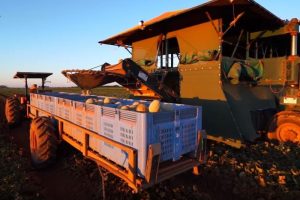Maybe rockmelon growers and Woolworth’s think Australian consumers are just too daft to understand things like Listeria and rockmelon.
 Listeria (and Salmonella) in cantaloupe has happened before.
Listeria (and Salmonella) in cantaloupe has happened before.
(A table of rockmelon-related outbreaks is available here.)
Here are some basic questions:
- was the farm prone to flooding and near any livestock operations;
- what soil amendments, like manure, were used;
- after harvest were the rockmelons placed in a dump tank;
- was the water in the dump tank regularly monitored for chlorine levels;
- did a proper handwashing program exist at the packing shed;
- were conveyor belts cleaned and tested;
- did condensation form on the ceiling of the packing shed;
- were transportation vehicles properly cooled and monitored;
- was the Listeria in whole cantaloupe or pre-cut; and,
- was the rockmelon stored at proper temperatures at retail?
I’m just spit-balling here, but these are basic questions that need to be answered before any dreams of regaining consumer confidence can be entertained.
Good on Coles.
 Rockmelons are, according to Dominica Sanda of AAP, starting to reappear on some Australian supermarket shelves, nearly a month after the fruit was linked to a deadly listeria outbreak.
Rockmelons are, according to Dominica Sanda of AAP, starting to reappear on some Australian supermarket shelves, nearly a month after the fruit was linked to a deadly listeria outbreak.
Woolworths stores in Queensland and Western Australia have been restocking the melon sourced from local farms, the company said Wednesday, but shoppers in other states will have to wait a little longer.
A spokeswoman said the supermarket has taken a “careful approach” with restocking the fruit and those being sold were from suppliers not affected by the recent outbreak.
Coles, however, is holding off on selling rockmelons as it continues to work with producers to meet its new increased standards.
“We will recommence supply from growers around Australia once this process is complete,” a spokesman told AAP.
The Australian Melon Association has welcomed the fruit’s partial comeback, which comes just in time for the melon season in the Northern Territory, Queensland and Western Australia.
“Growers in these regions want to reassure consumers that they have been reviewing their processing practices to ensure that the rockmelons are safe to eat,” industry development manager Dianne Fullelove said in a statement on Wednesday. “This is a huge vote of confidence in our industry and the efforts we are making to ensure that Australian rockmelons meet customers’ expectations – both here in Australia and internationally.”
